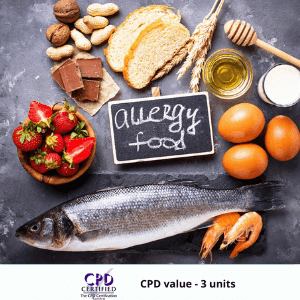Food Allergy Awareness Training
Allergies occur when the body’s immune system reacts to a usually harmless substance as though it is harmful. Why this happens, isn’t clear and food allergies symptoms can vary greatly from person to person. Most sufferers come from families that have a history of allergies, or related problems. Every year, the number of people with allergies are increasing. Taking a food allergy training course and having an understanding the dangers of allergens has become vital for those working in the food sector.
Our allergen awareness course covers general allergies, food allergies and food intolerances and explains the differences between them. It covers the 14 allergens controlled by legislation along with food additives and how they can trigger allergic reactions.
Customer must be informed if any food products sold by you that have ingredients comprising of any of the main 14 allergens.
Food Allergen Awareness Training
Allergen Awareness Course: List of Allergens
- celery
- cereals containing gluten – including wheat (such as spelt and Khorasan), rye, barley and oats
- crustaceans – such as prawns, crabs and lobsters
- eggs
- fish
- lupin
- milk
- molluscs – such as mussels and oysters
- mustard
- tree nuts – including almonds, hazelnuts, walnuts, brazil nuts, cashews, pecans, pistachios and macadamia
- peanuts
- sesame seeds
- soybeans
- sulphur dioxide and sulphites (if they are at a concentration of more than ten parts per million)
Food Allergies and Food Intolerances
Most physical reactions to food are caused by a food intolerance, rather than food allergies. Food intolerances and food allergies can cause some of the same signs and symptoms. So initially, it’s easy to confuse the two. Food intolerance and allergies symptoms often get confused. However, symptoms of food intolerances are usually less severe and symptoms to allergies to food are mainly often limited to digestive problems
Food Allergies are recognised by the medical community and generally a non-reversible. Food allergies are uncommon, although the symptoms are obvious and can appear within an hour. This rapid onset of allergies symptoms, and often the reaction, can magnify with each exposure. Symptoms are often triggered by minute amounts of food.
This course is primarily about awareness of allergies food. However, we do look at food intolerances, which are far more common and are just starting to gain more recognition by the medical community.
This food allergen awareness course takes a detailed look at the symptoms of food allergies and takes in the wider picture discussing the current theories of why rates are increasing. It then finishes off by covering practical steps that can be taken to reduce the risk from allergens and also what steps can be taken both internally and externally to monitor the control measures.
You can access the guidence on food allergen awareness course training at the Food Standards Agency
| Course Content | Module |
| Food Intolerance and Allergens: the Basics | 1 |
| Food Intolerances – Causes and Symptoms | 2 |
| Allergies – Causes and Symptoms | 3 |
| Allergen Facts | 4 |
| Food Allergens and the Law | 5 |
| Food Allergens – Practical Steps | 6 |
| Allergen Information for Consumers | 7 |
| Internal Monitoring and Review | 8 |
| External Monitoring and Review | 9 |
Allergen Awareness Course
Food Allergy Awareness Training

CPD Units ‘3’
Course Assessment
This online assessment for this food allergy training certificate is carried out by a series of multiple choice questions. Candidates must answer 70% of the questions correctly to pass each module. We advise you to complete each module and answer the question before moving on to the next module. This provides a better learning experience because you will need to have knowledge from earlier modules to understand some of the material in the later modules. For those who complete the course successfully, a PDF certificate of the award is sent directly to your inbox. Hard copies of the award are available on request. The course takes 100 minutes of training to complete. This is course content only and does not cover the time it takes to answer questions.
Other related courses to our allergen awareness course include:
Agile Food Safety Level 1 – Catering
Agile Food Safety Level 2 – Catering
Achieving Food Hygiene Level 5
Introduction to HACCP Level 2


